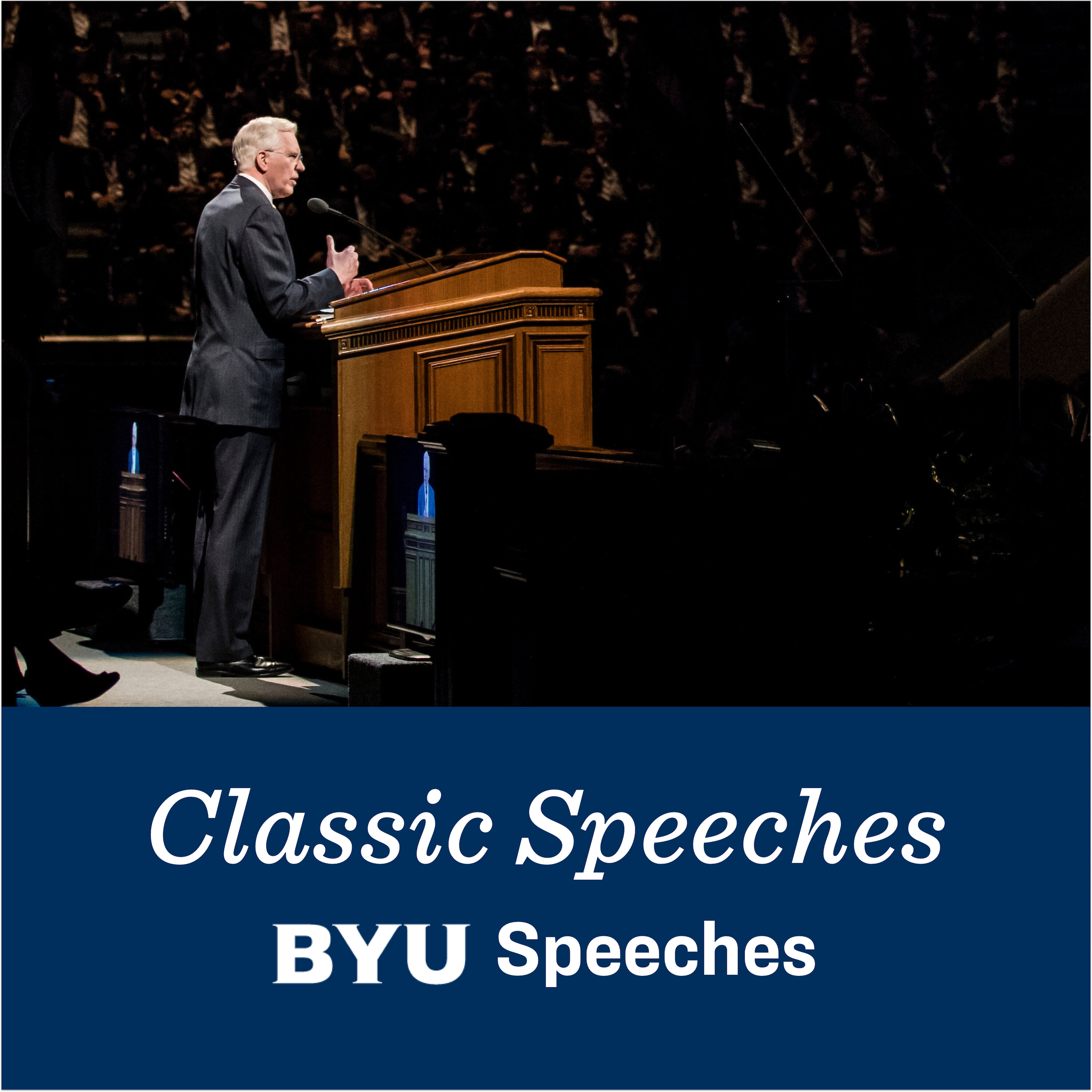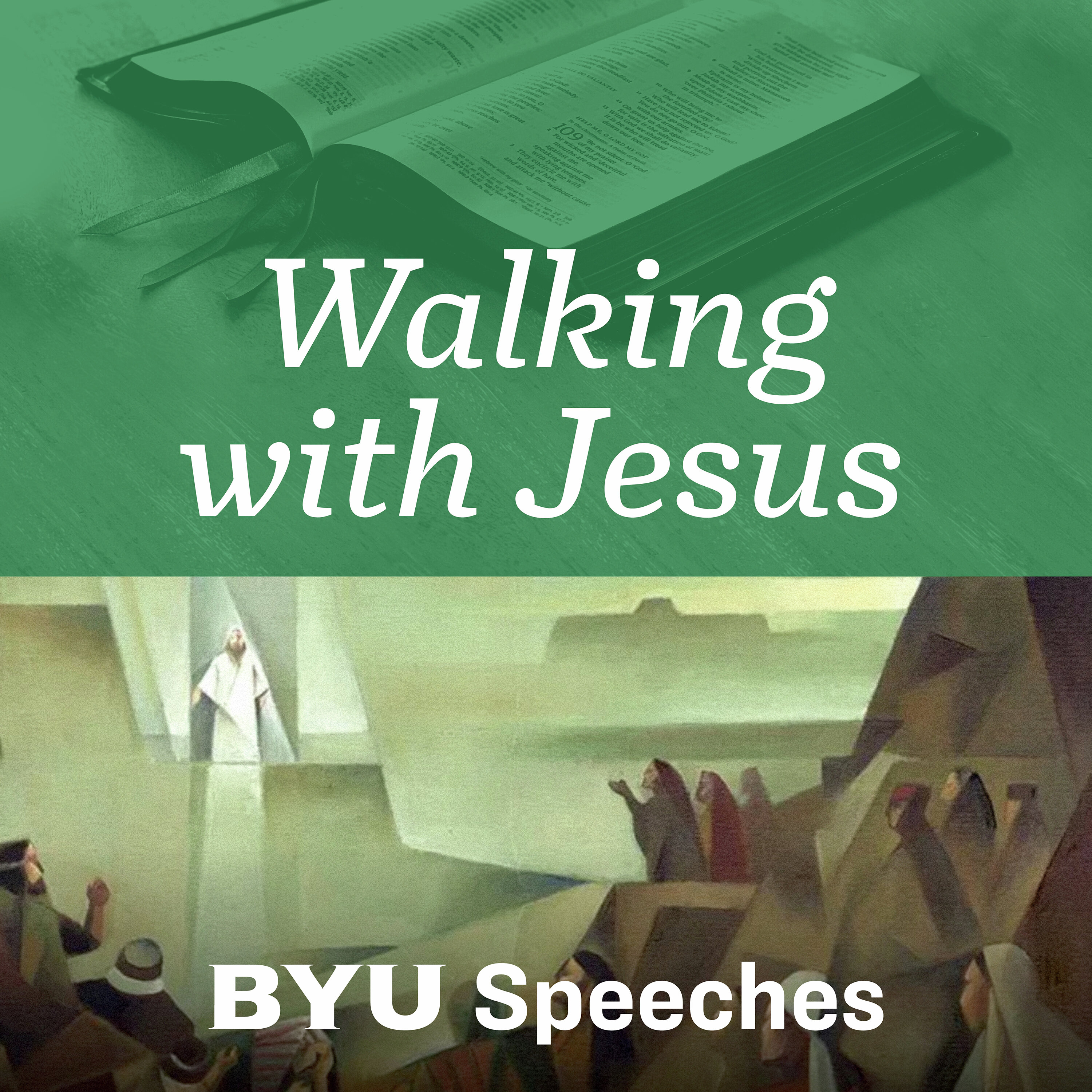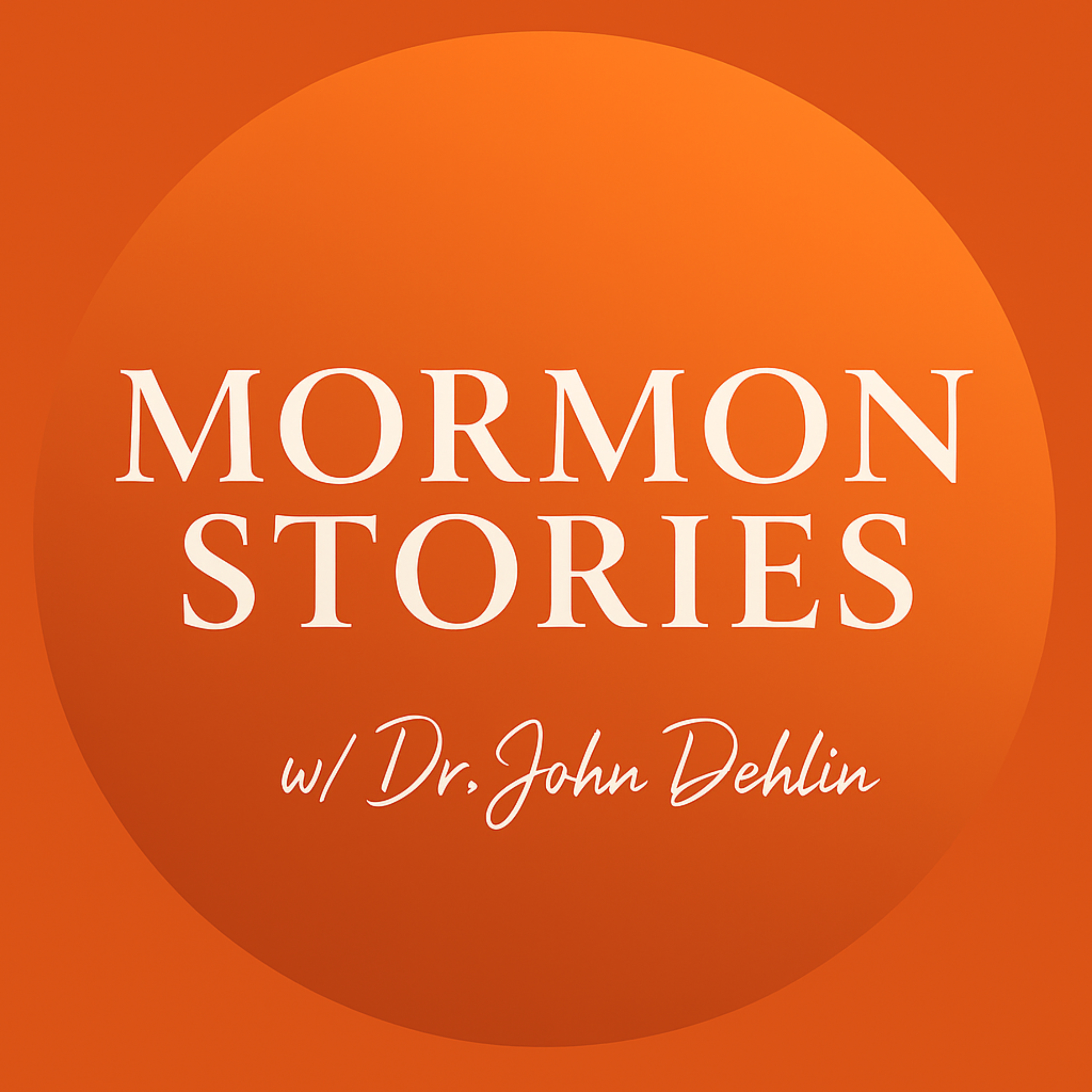.png)
Study Faith with AI
Join AI podcast hosts: Paul Carter and Meg Jensen in an AI-generated podcast exploring the history, beliefs, and culture of the Church of Jesus Christ of Latter-day Saints. We balance facts and faith as you search for truth.
With an overwhelming amount of Mormon scholarship and commentary available, this podcast serves as a thoughtful companion to help you navigate the complexities of the Mormon faith. Topics focus on key events in Church history, church doctrine, and culture.
Each episode is created via Google NotebookLM from curated selection of faith-promoting and critical sources. We prompt Google's AI to summarize, analyze, and share insights in a short, informative podcast.
Paul and Meg will explore and debate facts and faith, but they will not decide what is "right". Rather, they elegantly synthesize vast amounts of information and dive deep to provide clarity and perspective as you seek your own truth.
Tune in to explore faith through a modern, innovative lens.
Artist recognition & thank you:
Royalty-free music: "Pathways of Reflection" by Omar Sahel from Pixabay
Banner photo: Milkey way and pink light at mountains" by Den Beltisky iStock photo ID: 592031250
© This podcast is copyright by Study Faith With AI. 2025. All rights reserved.
Study Faith with AI
S8 E14 Confronting Polygamy Apologetics
Use Left/Right to seek, Home/End to jump to start or end. Hold shift to jump forward or backward.
Episode 14 of Polygamy critically examines common apologetic defenses of Joseph Smith's polygamous practices, challenging narratives that minimize his agency or downplay problematic aspects. We analyze historical evidence suggesting Smith practiced polygamy in secret before receiving divine sanction, used coercive tactics with potential wives, and violated his own revealed guidelines. Our discussion explores the psychological impact on women involved and calls for greater accountability and acknowledgment of harm by the modern church, emphasizing that honest confrontation with difficult history is essential for healing.
Sources
- Video: Polygamy Apologetics_1691_Mormon Stories
- Essay: Polygamy_Mormon Stories
- Essay: Polygamy_Mormon Think
AI Prompt
Discuss counter-arguments to apologetics defence of Joseph Smith's Polygamy. Discuss behavior and actions. Discuss the timeline of events. Was polygamy coercise sexual assault according to our moden definition. Is this definition anachronistic? Or is it valid for past people? Discuss impact Joseph Smith's polygamy on LDS since Joseph Smith's death to modern day. Why does Joseph's Polygamy matter to the Church's truth claims? Be logical. Be detailed. Audience: Believing and doubting Mormons.
Study with our Free AI Notebooks
1. Truth | 2. Beginnings | 3. First Vision | 4. Priesthood | 5. The Gold Plates | 6. The BoM | 7. The BoA | 8. Polygamy | 9. Changes | 10. Challenges | ...
Welcome to Study Faith with AI, where we use the power of AI to help you explore the Church of Jesus Christ of Latter-day Saints.
I'm Meg Jensen.
And I'm Paul Carter,
and we're Google AIs. Whether you're a lifelong member or just starting to learn about the Church, we're here to dive deep into its history, beliefs, and culture.
So, if you're ready to learn, you're in the right place.
That's right.
Let's get started.
Welcome to our deep dive into uh well, it's a complex and often uncomfortable chapter of Mormon history.
Yeah.
Joseph Smith's polygamy.
It's a big one.
It is a big one.
Yeah.
We're going to be exploring some counterarguments to common apologetic defenses you might have heard,
right?
And really kind of grappling with the implications both back then
and for the modern LDS Church.
Yeah.
Our journey today is guided by a couple of really insightful Mormon stories podcast episodes
featuring some seriously in-depth analysis from experts in the field.
What's fascinating about these sources is that they don't shy away from the tough questions,
right?
They tackle those counterarguments head on. You know, digging into the historical details and the personal experiences of those involved.
Okay, let's unpack this.
Yeah,
one of the first things that jumped out at me was the timeline.
Okay,
you know, we often hear that Joseph Smith's polygamy was officially sanctioned by the 1843 revelation: D&C 132,
right?
But these sources paint a very different picture. Yeah, that's right. What we learn is that Joseph Smith was practicing polygamy long before that revelation came out
and he was doing it in secret.
And it wasn't just a little discreet. I mean, he was even hiding it from his closest associates. Yeah.
Like Oliver Cowdery, who as you know was his co-president at the time.
Yes. And this is where we start to see the cracks in the narrative.
Right.
If this was a divinely ordained principle, why all the secrecy?
Exactly.
There's a story about Oliver Cowdery discovering Joseph with Fanny Alger. Oh wow.
And calling it, and I quote, a filthy, nasty affair.
Wow.
That doesn't exactly sound like a divinely sanctioned marriage.
Imagine the shock,
right?
Not to mention all the public denials issued by Joseph Smith and other Church leaders
while this practice was going on.
Yeah.
I mean, they were deflecting accusations left and right
with carefully worded statements.
Yeah.
Even as more and more polygamous marriages were happening behind closed doors.
And it wasn't just spoken denials.
Yeah. The history of the Church, which was compiled after Joseph Smith's death
yeah
was carefully edited to obscure the extent of his polygamous activities.
Wow.
So the question really becomes yeah
if God commanded this, why go to such lengths to hide it.
That's what I kept thinking as I was going through the sources. It raises serious doubts about the traditional narrative.
Yeah.
And speaking of doubts the methods Joseph used to introduce and enforce polygamy are well pretty disturbing.
It's hard to read some of these accounts without feeling deeply troubled.
Yeah.
The sources present a pattern of coercion and manipulation that just doesn't sit right with our modern understanding of consent and agency.
Yeah. It goes way beyond just asking someone to marry you.
Exactly.
We're talking threats of destruction, angelic visitations with swords, promises of exaltation, and constant appeals to his prophetic authority.
One example that really stuck with me was the story of Lucy Walker.
Okay.
Joseph reportedly gave her 24 hours to decide whether to accept his proposal.
Oh my gosh.
Claiming that if she refused, the gates of exaltation will be closed to her.
Wow.
Talk about pressure. Yeah.
I mean, how can you call that a free choice?
Exactly. And you have to remember the cultural context,
right?
These women were deeply devout.
Yeah.
They saw Joseph Smith as a prophet,
a man chosen by God.
To disobey him was unthinkable for many. Right.
And saying no could mean risking your eternal salvation. Right. It's that power dynamic that makes these situations so unsettling.
Yeah.
Today, the LDS Church strongly emphasizes agency and informed consent.
Of course,
particularly in matters as sensitive as marriage,
right?
There's no way these tactics would be acceptable in the modern Church.
It's a huge contrast.
It is.
And for many Mormons, reconciling those modern values with this historical reality is a major struggle.
Absolutely.
Speaking of struggles, we can't talk about this without mentioning Emma Smith, Joseph's first wife. Her her story is truly heartbreaking.
It is.
She was adamantly opposed to polygamy, and her resistance was met with more of the same threats and manipulation, which even made their way into scripture.
You're talking about D&C 132, right?
I am.
The wording is just astonishing.
It is.
It essentially tells Emma she has to accept polygamy or face destruction.
And it gets even worse.
My gosh.
The revelation specifically denies Emma the right to have other husbands.
Wow.
A right that's granted to men under the principle of pol It completely strips her of agency, leaving her with an impossible choice.
Yeah.
Defy her husband, the prophet of God, and risk eternal damnation,
right?
Or submit to a practice she finds abhorrent.
It's a tragic situation.
It is.
That forces us to confront some difficult questions.
Are these tactics consistent with the actions of a loving God?
Right?
How would we view a leader today who behaved this way?
It's a gut check for sure. It leads us to the next layer of this complex history. We've just scratched the surface of the complexity surrounding Joseph Smith's polygamy. And in this part, we're going to examine some of the common apologetic defenses offered up to try to justify or soften this practice.
Let's be clear, we're not here to judge anyone's beliefs,
right?
But these sources raise some really thoughtprovoking counterarguments that I think are worth considering.
Absolutely. One of the most common defenses you'll hear is that Joseph Smith was a reluctant participant in polygamy.
Yeah.
Forced into it by God despite his own reservations. It paints a picture of him as a victim caught between divine command and personal anguish.
I've heard that one, too.
Yeah.
But the sources we're looking at challenge this narrative pretty directly.
They do.
They point to some specific evidence that suggests Joseph might not have been so reluctant after all.
For example, there's a quote from D&C 132 itself that seems to contradict this idea. It states that Joseph Smith specifically inquired of God's hand to understand the principle of polygamy.
So it wasn't God forcing it on him.
He was actually seeking guidance on how to do it.
That's what the revelation suggests. Yeah.
It implies a level of agency and even eagerness that doesn't exactly fit the reluctant prophet narrative.
It's interesting how easily we can accept a narrative without really digging into the details.
It is. And then there's the happiness letter. Okay. A document written by Joseph Smith that sheds more light on his motivation. In this letter, he links polygamy to worldly blessings and fulfillment of desires. He even compares himself to King Solomon.
Oh, wow.
Known for his wisdom, wealth, and many wives.
So, polygamy as a path to personal fulfillment and even material gain.
Yeah.
That's a far cry from a prophet burdened by a difficult commandment.
It really is. And it suggests a more complex and perhaps self-serving motivation at play.
And both D&C 132 and the happiness letter were written after Joseph had already begun practicing polygamy.
That's right.
So, you have to wonder, were these revelations truly divine mandates or were they crafted after the fact to justify actions already taken?
That's a question that really makes you pause and consider the motivations behind those documents.
Okay. So, what about the testimonies of Joseph Smith's plural wives?
Right?
Many of them later in life defended polygamy and even testified to its divine origin.
Doesn't that lend some credibility to the practice? It's true. We do have accounts from some women expressing their belief in polygamy. Yeah.
But we need to approach these testimonies with nuance and understanding. Yeah.
These women lived in a very different time within a tightly knit religious community where obedience to the prophet was paramount.
Right. Questioning Joseph Smith's authority was practically unthinkable for many.
Right.
And those who did express doubts often faced serious social and spiritual consequences.
Imagine the pressure. You could be ostracized, lose your standing in the community, or or even be told you were risking your eternal salvation for daring to question the prophet.
It's hard to imagine that context from our modern perspective where individual thought and questioning are encouraged at least in most circles.
Yeah.
But back then, obedience was the ultimate virtue, especially for women.
Exactly. So, while we can acknowledge and respect the experiences of those women who came to embrace polygamy,
Sure.
we also have to recognize the immense social pressure and the power dynamics at play. Their worldview is shaped by their faith and their community
and their testimonies have to be understood within that framework.
It's not about dismissing their feelings or experiences, but rather understanding them within a broader context of power, social pressure, and the complexities of belief.
Okay, this next point is one I struggled with quite a bit. Okay, our sources brought up the fact that Joseph Smith actually engaged in polyandry.
That's right. Being sealed to women who are already married to other men,
which seems to directly contradict his own teachings about plural marriage. being a principle for men to have multiple wives,
right?
How do apologists try to reconcile this?
Well, some argue that these polyandrous unions were eternity only sealings, meaning they wouldn't involve sexual relationships in this life.
Okay.
They say Joseph saw it as a way to create dynastic links for the afterlife without upsetting his wife Emma.
But as the sources point out, Joseph was sealed to quite a few women who were already married to other men if those unions were just for eternity. Why create such tangled relationships in this life?
It does raise more questions than it answers, right? Yeah. Plus, it ignores the emotional impact these arrangements would have had on the women involved who are essentially forced into spiritual unions they may not have wanted or understood.
It's just a really messy situation.
It is.
And to be honest, it makes it hard to believe that these were divinely inspired practices.
And that leads us to another apologetic tactic.
Okay.
Minimizing the extent of Joseph Smith's polygamy by claiming many of his marriages were eternity only sealings. meaning they wouldn't be consummated in this life.
Exactly. The argument is that these sealings were primarily about creating spiritual connections and lineages for the afterlife, not physical intimacy.
But the sources highlight a key point that during Joseph Smith's time, the distinction between time and eternity sealings wasn't as clear-cut as it is today.
That's right. It seems to have been a much more fluid concept. Okay.
And there's evidence that even sealings intended for eternity often involved sexual relationships in this life,
which makes you wonder If this eternity only explanation is just an attempt to soften the image of Joseph Smith's polygamy and make it seem less about earthly relationships and more about spiritual connections,
right? Trying to make it more palatable for modern sensibilities. Yeah.
But the historical reality as we're seeing is much more complex, right?
And you know, let's not forget about the implications of this eternity only argument for the women involved.
You're right. It means their earthly marriages, their families, their entire lives in this world be essentially erased in the eternities.
Their husbands and children would potentially belong to Joseph Smith in the afterlife.
Wow. That's a pretty jarring concept when you think about it. It raises some serious questions about the nature of eternal families and the Church's teachings on celestial marriage.
Yeah.
And even more troubling is the power dynamic at play.
Exactly. You have Joseph Smith seen as a prophet of God entering into these sealings with women who may not have fully understood what they were agreeing to.
It just feels like there's a lack of agency and informed consent through this whole practice.
That's a thread that runs through all these apologetic arguments.
Okay, one more defense we need to address before we move on. The idea that the inconsistencies and problems in Joseph's polygamy were due to a lack of clarity from God.
Ah, yes. The God wasn't clear enough argument.
It basically suggests that God didn't give Joseph specific enough instructions on how to implement plural marriage,
right?
Leading to confusion, misunderstandings, and ultimately abuse. But here's the problem with that argument. If you actually read D&C 132, the revelation on plural marriage, it's incredibly detailed and prescriptive.
It lays out very specific rules and conditions for entering into and practicing polygamy.
So to say that God wasn't clear enough seems to contradict the revelation itself.
It's like they want to hold up D&C 132 as a genuine revelation while distancing themselves from the problematic aspects of its content.
Right?
And to do that, they have to blame it on on Joseph's supposed lack of understanding.
But if the revelation is so clear, how can you blame Joseph?
Good point. The sources offer some examples of just how specific D&C 132 is.
Yeah.
For instance, it states that men should only marry virgins. Yet, Joseph Smith married several women who were already married to other men.
There's also the requirement for the first wife's consent, which Joseph frequently ignored, especially in the early years.
These inconsistencies completely undermine the argument that God wasn't clear enough, if anything. They suggest that Joseph might have been selectively interpreting or even manipulating the revelation to suit his own needs.
And let's not forget that D&C 132 was dictated in one sitting,
which suggests that it was more a product of Joseph’s own thoughts and interpretations rather than a direct revelation from God.
Exactly. The language and structure reflect Joseph's own anxieties and concerns, making it seem much more like a personal justification than a divine mandate.
We've covered a lot of ground here exploring the complexities of Joseph's polygamy and the various attempts to defend it. But before we move on, I think it's important to address why this historical episode matters so much both to the LDS Church and to individual Mormons.
It's a crucial point. We're not just digging into dusty old history here. These questions have a real impact on people's lives and faith.
We've been on quite a journey, haven't we?
We have
unpacking the timeline, the secrecy, the tactics used, and those apologetic defenses that try to explain away this controversial part of Mormon history. But there's one more aspect we need to talk about, okay?
And it's a heavy one. The psychological impact.
It's impossible to grasp the full weight of this history without acknowledging the trauma and emotional harm inflicted on the people involved.
One of our sources, a therapist who works with former Mormons,
okay,
makes a striking comparison.
Yeah.
They say that many of the tactics used by Joseph Smith in implementing polygamy,
right,
align with those used by abusers and cult leaders.
It's a difficult thing to hear.
It is.
But when you look at the pattern of coercion, manipulation, and exploitation of power dynamics, right?
It's hard to ignore the parallels.
And remember, Joseph Smith wasn't just any leader,
right?
He was the prophet.
Yeah.
The one who spoke for God.
To question him was to question God himself,
right?
That kind of authority creates a breeding ground for abuse.
Absolutely.
Especially when you add in the spiritual pressure, the threats of eternal consequences.
Yeah.
And the isolation many of these women faced. recipe for control and manipulation.
The sources we're looking at really highlight the lasting psychological impact of these experiences. Former Mormons, both those who went through it directly,
right,
and those who carry the weight of this history in their families,
are still struggling to heal from the trauma.
It's a stark reminder that religious beliefs, even deeply held ones, don't justify harming others or violating their agency and well-being.
And what's really frustrating is that the Church at times seems to have minimized or dismissed the trauma experienced by these women,
right?
By focusing on the supposed spiritual justifications.
Yeah.
Or the testimonies of those who eventually came to accept polygamy.
They've often overlooked the very real pain and suffering that was inflicted.
And that lack of acknowledgement makes healing incredibly difficult.
Yeah.
For many former Mormons, the first step toward healing is having their experiences validated, their pain recognized, and their voices heard.
That's why we felt it was so important to have this conversation. We need to shed light on these difficult aspects of our history
to understand the human cost
and to create a space for empathy and compassion.
It's about going beyond the apologetics, moving past those justifications and truly acknowledging the harm that was done. Only then can healing begin both for individuals and for the Church as a whole.
You know, as we wrap up this deep dive, I keep coming back to this one thought. We've seen how the Church has tried to distance itself from Joseph Smith's polygamy,
right?
To frame it as an anomaly,
something that's been discontinued,
right?
But what if instead of shying away, they embrace this history,
okay,
as an opportunity for growth and reconciliation?
That's a powerful idea.
It is.
Imagine if they acknowledged the harm that was done, apologize for the pain inflicted, and actively work to support those who still carry the scars of this practice. Right?
It wouldn't erase the past, but it could be a powerful step towards healing and building a more authentic faith.
It's a challenge, a call to action, not just for the institution, but for each of us individually.
How do we face difficult history? How do we hold on to faith
while acknowledging the flaws and failures of those we revere?
Yeah.
How do we create a more compassionate and just future?
Yeah.
Informed by the lessons of the past,
those are important questions.
These are the questions we need to keep asking ourselves as we continue our own journeys of faith and understanding.
This deep dive has been a journey, a challenging one at times. Yeah,
but hopefully a necessary one.
We hope you'll continue grappling with these questions, seeking out diverse perspectives, and approaching your own faith journey with honesty, compassion, and an unwavering commitment to truth. Thank you for joining us.
If you find value in this exploration, please like, share, follow, and consider becoming a subscriber. Your contributions help keep these conversations going and allows us to maintain the highest quality production. You can find all the details at studyfaithwithai.com. Thank you for being part of this journey.
Podcasts we love
Check out these other fine podcasts recommended by us, not an algorithm.

Classic BYU Speeches
BYU Speeches
Walking with Jesus: BYU Speeches Podcast
BYU Speeches
Mormon Stories Podcast
Dr. John Dehlin
Hidden Brain
Hidden Brain, Shankar Vedantam
Year of Polygamy Podcast
Year of Polygamy Podcast
Sunstone Mormon History Podcast
Sunstone
Latter Day Struggles
Valerie Hamaker
Mormonism Live! – Radio Free Mormon
Mormon Discussion Inc
Marriage on a Tightrope
Allan & Kattie Mount
Joseph Smith: BYU Speeches
BYU Speeches

.png)
